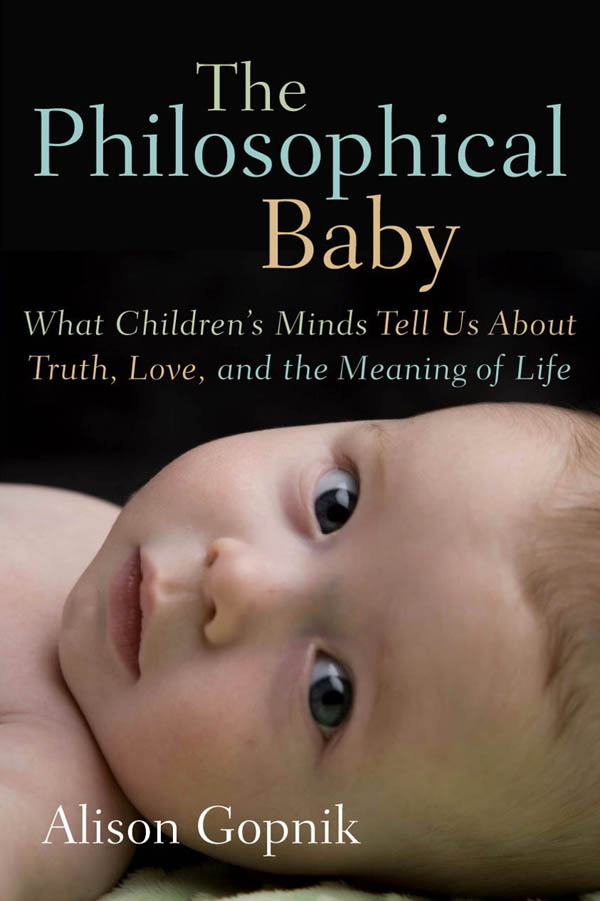The Philosophical Baby published 4 Aug 2009 by Farrar, Straus and Giroux
To Order Latest Reviews Other Languages
New York Times Extended List Bestseller
San Francisco Chronicle Bestseller
Independent Bookstores Bestseller
New York Times Editor's Choice
San Francisco Chronicle Editors Choice
Recommended Reading Scientific American
Babble's 50 Best Parenting Books
For most of us,
having a baby is the most profound, intense, and fascinating experience of our
lives. Now scientists and philosophers are starting to appreciate babies, too.
The last decade has witnessed a revolution in our understanding of infants and
young children. Scientists used to believe that babies were irrational, and
that their thinking and experience were limited. Recently, they have discovered
that babies learn more, create more, care more, and experience more than we
could ever have imagined. And there is good reason to believe that babies are
actually smarter, more thoughtful, and even more conscious than adults.
This new science holds answers to some of the deepest and oldest questions
about what it means to be human. A new baby’s captivated gaze at her mother’s
face lays the foundations for love and morality. A toddler’s unstoppable
explorations of his playpen hold the key to scientific discovery. A three-year-old’s
wild make-believe explains how we can imagine the future, write novels, and
invent new technologies. Alison Gopnik—a leading psychologist and philosopher,
as well as a mother—explains the groundbreaking new psychological,
neuroscientific, and philosophical developments in our understanding of very
young children, transforming our understanding of how babies see the world, and
in turn promoting a deeper appreciation for the role of parents.
- Alison Gopnik
Alison Gopnik’s absorbing, smart, and enjoyable book might be better titled The Philosophical Developmental Psychologist. Her remarkably thoughtful and carefully reasoned studies into how babies learn and think give intriguing insights and new ways of reflecting on consciousness and creativity in adults as well. In a refreshing counterpoint to speculations in evolutionary psychology her lucid and engaging descriptions of experiments with babies demonstrate how much can be understood simply by asking the right questions with an open and critical mind. Parents and scientists will enjoy the insights but so will anyone who has thought about the question of what it means to be human.
- Lisa Randall, author of Warped Passages: Unraveling the Mysteries of the Universe's Hidden Dimensions
This book really makes you think about consciousness. The mind of a child is a strange and wonderful world.
- Temple Grandin, author of Thinking in Pictures
In The Philosophical Baby, Alison Gopnik reveals the latest scientific discoveries--many of them quite surprising--about the developing minds of young children. She also presents a richly provocative and endlessly insightful story that unites the endearing other-worldliness of children's imaginations with some of the oldest and most profound questions in philosophy. This book is at once touching, eloquent, and masterful in its fascinating revelations about what makes us human.
- Frank J. Sulloway, former MacArthur Fellow and author of Born to Rebel: Birth Order, Family Dynamics, and Creative Lives
After convincing us that the seemingly familiar human child is actually wrapped in mystery, Alison Gopnik offers a compelling and convincing portrait of the opening years of life. This is scientific writing of the highest order.
- Howard Gardner, Hobbs Professor of Cognition and Education, Harvard Graduate School of Education
